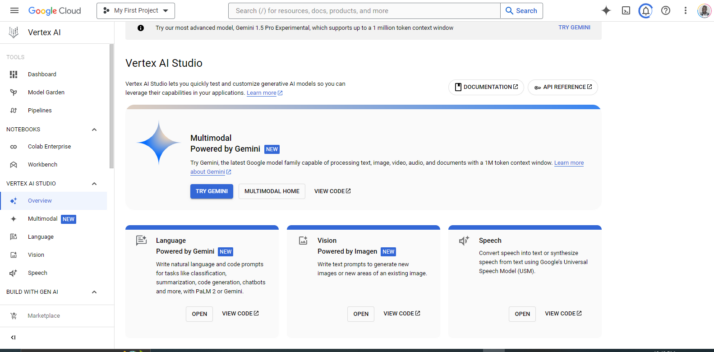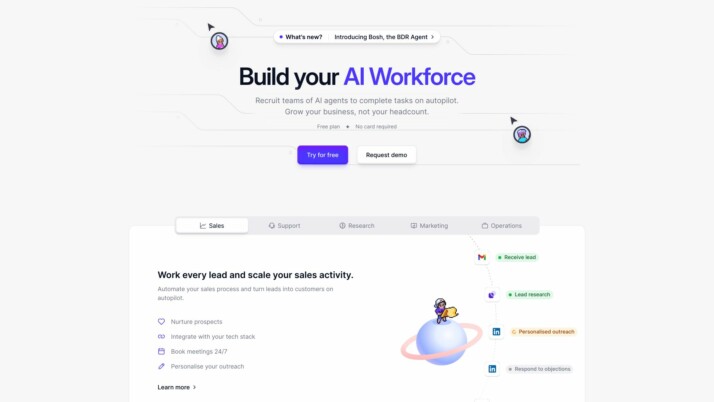Vertex AI vs. Relevance AI: Comparing Enterprise and Low-Code AI Platforms
AI-powered software development platforms revolutionize how businesses create intelligent applications. Vertex AI vs. Relevance AI offer distinct approaches to building AI agents, each with unique strengths. Vertex AI excels in enterprise-scale deployments with advanced capabilities, while Relevance AI emphasizes rapid development through a low-code environment. This comparison explores their key features, use cases, and limitations to help you choose the right platform for your AI development needs. We’ll also introduce SmythOS, a powerful alternative that combines ease of use with robust functionality, potentially surpassing both in versatility and accessibility.
Vertex AI Overview
Vertex AI empowers developers and businesses to build, deploy, and manage machine learning models at scale. Google’s comprehensive platform integrates advanced AI capabilities with robust cloud infrastructure, streamlining the entire ML lifecycle.
Vertex AI’s standout feature is its support for multimodal generative AI models like Gemini. These models process text, images, audio, and video inputs, enabling sophisticated applications from chatbots to content generation. The platform’s Model Garden offers a curated selection of pre-trained models, including Google’s proprietary offerings and select open-source options, accelerating development and deployment.


Screenshot from Vertex AI studio.
Vertex AI’s standout feature is its support for multimodal generative AI models like Gemini. These models process text, images, audio, and video inputs, enabling sophisticated applications…
For enterprises, Vertex AI delivers powerful tools for model customization, performance monitoring, and MLOps. Features like the Model Registry and Feature Store facilitate efficient model management and feature serving. The platform’s integration with Google Cloud services ensures seamless scalability and robust security measures, critical for large-scale AI deployments.
While Vertex AI excels in flexibility and advanced capabilities, it requires a degree of technical expertise. The platform lacks a true no-code editor, which may present a barrier for non-technical users seeking to leverage AI. Additionally, the complexity of some features might necessitate a steeper learning curve compared to more simplified AI platforms.
Vertex AI’s strength lies in its ecosystem integration and enterprise-grade features. The platform supports a wide range of APIs and robotic process automation tools, enabling AI agents to interact with various systems and data sources. This makes Vertex AI particularly suitable for organizations looking to embed AI deeply into their existing workflows and applications.
Relevance AI Overview
Relevance AI empowers users to create and deploy AI agents with minimal coding. The platform caters to developers, business leaders, and non-technical professionals seeking to harness AI capabilities efficiently.
Relevance AI offers a low-code environment for building customizable AI agents and tools. Users can integrate multiple Large Language Model providers, access a built-in vector store, and deploy features through a fully managed service. The platform’s flexibility allows for quick development of AI solutions adaptable to various industries and use cases.


Screenshot of Relevance AI Website
Relevance AI empowers users to create and deploy AI agents with minimal coding.
Key features include AI agent creation, pre-built templates, and robust data management capabilities. Relevance AI supports multimodal inputs, enabling the processing of text, images, audio, and video. The platform also provides tools for model debugging, performance monitoring, and scalable deployment options.
While Relevance AI excels in many areas, it may present challenges for users requiring extensive customization beyond its low-code interface. The platform’s emphasis on accessibility could potentially limit advanced users seeking granular control over AI model architectures.
Relevance AI integrates with existing systems through APIs and supports collaboration among AI agents. This positions the platform as a versatile solution for businesses looking to enhance workflows with intelligent automation. However, users should consider their specific technical requirements and scalability needs when evaluating Relevance AI against other AI agent builders in the market.
Feature Comparison
Vertex AI and Relevance AI offer distinct approaches to AI agent development and deployment. Vertex AI provides a comprehensive suite of tools for building and managing machine learning models at scale, with strong support for advanced AI capabilities like multimodal generative models. Its integration with Google Cloud services ensures robust security and scalability for enterprise deployments. However, Vertex AI lacks a true no-code editor, potentially limiting accessibility for non-technical users.
Relevance AI, in contrast, emphasizes a low-code environment for quick AI agent creation. It offers multi-provider support, allowing users to integrate and switch between different Large Language Model providers. Relevance AI includes a built-in vector store and provides a fully managed service for deploying Large Language Model features, simplifying infrastructure concerns. While this approach enhances accessibility, it may constrain users requiring extensive customization beyond the low-code interface.
Both platforms support multimodal inputs, autonomous agents, and collaboration features. However, Vertex AI’s enterprise-grade offerings and deep integration with Google’s ecosystem may give it an edge for large-scale, complex deployments. Relevance AI’s focus on rapid development and deployment could make it more appealing for smaller teams or projects with tight timelines.
Feature Comparison Table
| Vertex AI | Relevance AI | SmythOS | |
|---|---|---|---|
| CORE FEATURES | |||
| No-Code Options | ❌ | ✅ | ✅ |
| Explainability & Transparency | ✅ | ❌ | ✅ |
| Multi-Agent Collaboration | ✅ | ❌ | ✅ |
| Audit Logs for Analytics | ❌ | ❌ | ✅ |
| Work as Team | ✅ | ❌ | ✅ |
| SECURITY | |||
| Constrained Alignment | ✅ | ❌ | ✅ |
| IP Control | ✅ | ❌ | ✅ |
| COMPONENTS | |||
| Huggingface AIs | ❌ | ❌ | ✅ |
| Zapier APIs | ❌ | ❌ | ✅ |
| Data Lakes | ✅ | ❌ | ✅ |
| DEPLOYMENT OPTIONS (EMBODIMENTS) | |||
| DATA LAKE SUPPORT | |||
| Sitemap Crawler | ❌ | ❌ | ✅ |
| YouTube Transcript Crawler | ❌ | ✅ | ✅ |
| URL Crawler | ✅ | ❌ | ✅ |
Best Alternative to Vertex AI and Relevance AI
SmythOS emerges as the superior alternative to Vertex AI and Relevance AI, offering a comprehensive agentic AI automation platform that combines power and accessibility. Our platform excels in ease of use, feature richness, and versatility across unlimited use cases.
We provide an intuitive drag-and-drop interface that democratizes AI development, allowing users of all skill levels to create sophisticated AI agents without extensive coding knowledge. This visual builder approach significantly outpaces Vertex AI’s more technical interface and offers greater customization than Relevance AI’s low-code environment.
SmythOS emerges as the superior alternative to Vertex AI and Relevance AI, offering a comprehensive agentic AI automation platform that combines power and accessibility.
Our platform boasts an unmatched feature set, incorporating advanced capabilities like multi-agent collaboration, explainable AI, and a wide array of deployment options. Unlike Vertex AI’s enterprise-focused approach or Relevance AI’s emphasis on rapid development, SmythOS strikes an optimal balance between power and usability. We support a diverse range of AI models and integrations, enabling users to leverage cutting-edge technologies while maintaining flexibility.
SmythOS stands out with its robust security features, including constrained alignment and IP control, addressing critical gaps in Relevance AI’s offerings. Our platform also excels in data handling, providing support for various data sources and formats that surpass both competitors. This comprehensive approach ensures that SmythOS can adapt to virtually any use case, from simple chatbots to complex, multi-agent systems for enterprise-level automation.
By choosing SmythOS, users gain access to a future-proof platform that combines the best of both worlds — the enterprise-grade capabilities of Vertex AI and the rapid development focus of Relevance AI — all within a more accessible, feature-rich, and versatile package. Our commitment to innovation and user empowerment makes SmythOS the ideal choice for businesses and developers looking to harness the full potential of AI automation.
Conclusion
Vertex AI and Relevance AI offer powerful AI development platforms, each with unique strengths. Vertex AI excels in enterprise-grade features and deep integration with Google’s ecosystem, making it ideal for large-scale, complex deployments. Relevance AI shines with its low-code environment, enabling rapid AI agent creation for teams seeking quick deployment.
However, SmythOS emerges as the superior choice, combining the best of both worlds. Our platform offers unparalleled flexibility, ease of use, and powerful features that cater to a wide range of users. With SmythOS, you can create sophisticated AI agents using our intuitive drag-and-drop interface, leveraging over 300,000 integrations to build complex workflows effortlessly.
Unlike Vertex AI’s steep learning curve and Relevance AI’s potential limitations for advanced customization, SmythOS provides a perfect balance of accessibility and power. Our “Create Once, Deploy Anywhere” approach allows you to seamlessly deploy AI agents across multiple platforms, from chatbots to APIs, without the need for extensive coding knowledge.
Experience the future of AI development with SmythOS. Create a free account today and discover how our platform can revolutionize your workflow. With unlimited agents, a 30-day money-back guarantee, and the ability to automate complex tasks, SmythOS is your gateway to unlocking the full potential of AI for your business. Don’t just adapt to the AI revolution – lead it with SmythOS.
Last updated:
Disclaimer: The information presented in this article is for general informational purposes only and is provided as is. While we strive to keep the content up-to-date and accurate, we make no representations or warranties of any kind, express or implied, about the completeness, accuracy, reliability, suitability, or availability of the information contained in this article.
Any reliance you place on such information is strictly at your own risk. We reserve the right to make additions, deletions, or modifications to the contents of this article at any time without prior notice.
In no event will we be liable for any loss or damage including without limitation, indirect or consequential loss or damage, or any loss or damage whatsoever arising from loss of data, profits, or any other loss not specified herein arising out of, or in connection with, the use of this article.
Despite our best efforts, this article may contain oversights, errors, or omissions. If you notice any inaccuracies or have concerns about the content, please report them through our content feedback form. Your input helps us maintain the quality and reliability of our information.
